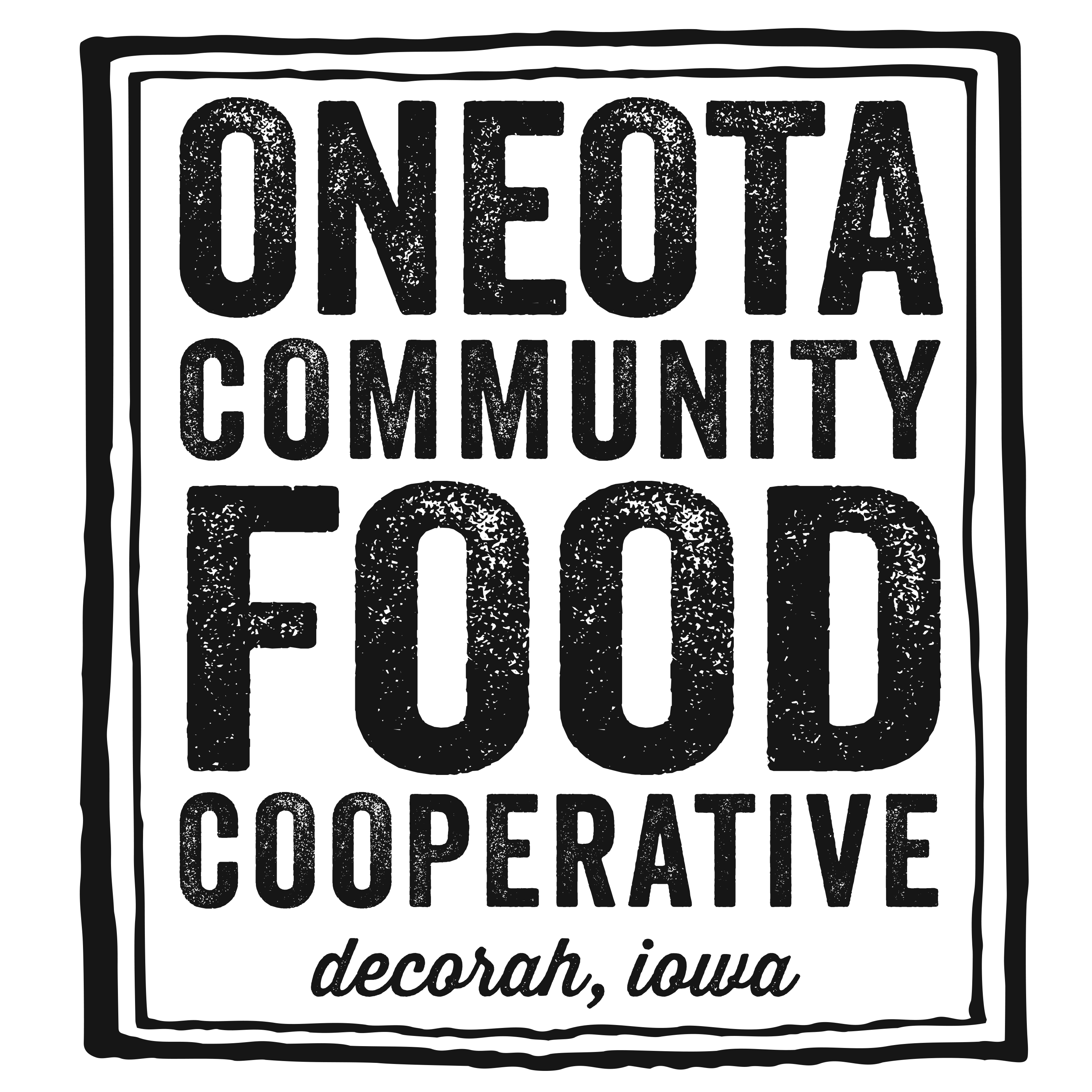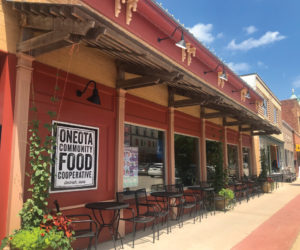River Root Farm
By Betsy Peirce, Produce Manager
If you have traveled along Locust Road lately, you may have noticed new agricultural development going up in the form of greenhouses. The old Mel Faldet farm is the new home of River Root Farm operated by Mike Bollinger and Katie Prochaska and their children Oliver and Addie. They settled on relocating their farm from a hilly, forested piece of land on River Road once they realized how quickly they were growing beyond the capacity of the tillable land available. The new location offers a long term rental agreement, instant organic certification, more tillable land to farm on as well as a desirable proximity to their markets in Decorah and the kids’ schools.
Mike and Katie have not come by their farming endeavor lightly. Each step in their lives and careers has earned them the experience and knowledge necessary to be strategic and entrepreneurial in their field. Mike and Katie are both graduates of Luther College. Post college, Katie traveled to Mali West Africa to volunteer in the Peace Corps as an Agriculture and Natural resource Management Volunteer. She had her first gardening experiences there where she was responsible for facilitating a school garden and a tree nursery, both designed to teach valuable skills as well as to raise money for the school through sales. Mike joined Katie in Mali to learn the language and to assist Katie in her work. After Peace Corps they returned to home base, Decorah, to further their produce and gardening related skills. Mike worked in the Produce department at the Oneota Co-op and they both worked on the garden crew at Seed Savers Exchange.
Feeling the need to find a path to somewhere, they applied, and were chosen for a much sought after Nearing Residency at the Helen and Scott Nearing Good Life Center (http://goodlife.org/) in Harborside, Maine. Their official title was “Resident Stewards,” which meant that they became caretakers of the self sufficiency display gardens on the farm, as well as guiding tours for the hundreds of visitors who came to the farm each year. They also taught about self sufficiency through the land. They gained valuable work and farming experience at the Good Life Center as well as serendipitously becoming acquainted with their neighbors, Elliot Coleman and Barbara Damrosch. The Coleman/ Damrosch’s are accomplished extended season gardeners as well as having authored several bestselling titles about organic gardening. (The New Organic Grower and The Winter Harvest Manual – Coleman, and The Garden Primer by Damrosch). Elliot was impressed with their work ethic and needed a farm manager. Mike and Katie saw an opportunity and they seized it.
Upon completion of the residency at the Good Life Center, Mike and Katie moved to Elliot and Barbara’s farm into a small cabin built by Elliot, where they would spend the next two years as farm managers. Mike and Katie credit Coleman and Damrosch for introducing them to season extension by using greenhouses. The couple is renowned for their success with year-round food production accomplished through the use of high tunnels which are metal hoops covered in a thick plastic which traps more heat, but still allows light in. Of their time at Four Season Farm, Katie speaks highly and says “Our time working there was always about learning more – gardening is so fun and he [Coleman] was so experimental about it all. He was constantly having us recording temps and dates. We definitely learned from him that it’s never going to be perfect – and that is the essence of it [farming]. There will always be next year.”
When it was time to move on to the “next thing,” Katie got a job working for the Chicago Botanic Garden as Manager of the fruit and vegetable garden. Mike also worked for the Botanic Garden as the farm manager for the Green Youth Farm, a summer job program for high school kids. Soon after they found they were pregnant with Oliver and decided that the city life was not what they wanted for their family. They were hired for the next chapter in “farming 102” by Heritage Prairie Farm (HPF), an urban farm and CSA 30 miles outside Chicago with an on-site market. The job at HPF proved to be yet another excellent opportunity to add to their growing body of knowledge. While they were there, they set up 4 moveable Elliot Coleman system greenhouses. It was at HPF that they learned how to grow and market one of their future market niches: Micro greens. (Micro greens are nutrient dense very young plants. They are harvested after only 14 days and are extremely rich in vitamins and phytonutrients. According to new research by US department of Agriculture and sponsored by the University of Maryland, almost all varieties of micro greens have four to six times more nutrients than the mature leaves of the same plant). Mike and Katie remained at HPF for 1 ½ years until they felt they were ready to make a go of it on their own. We are so lucky that Decorah is the place they chose to put down those River Roots!
On their new farm they are hopeful for the opportunities offered by this community. One of Mike and Katie’s strengths is that they have taken time to research the market and the richness that is Northeast Iowa, and then determine what holes needed filling. “We have been exploring ways we can improve the richness of this community and what it offers in terms of local food,” says Mike. “We have found that [niche] through the sales of our high quality organic transplants sold at Oneota Community Co-op and Seed Savers Exchange. Our Micro greens are sold locally at the Co-op and are on the menu at a few area restaurants, as well as in LaCrosse, Viroqua, Minneapolis and St. Paul. We also do seed production (garlic and Cucurbits) for Seed Savers and another associate.” As Katie said “We want to continue to do what we love to do: grow fresh organic food; build great soil (right in town!); cultivate new gardeners through our seedling sales; serve as a community resource for new growers (and eaters) of great food; and lastly incorporate the principles of community involvement, education, innovation, and ecological stewardship.”
The expansion of River Root Farm will consist of a 96-foot-long heated greenhouse (1/3 longer than their previous one), and 4 high tunnel greenhouses. They will take time to build the soils in each high tunnel gradually by ramping up production as the season goes along. They will have one tunnel planted for spring, 2 for summer production and all 4 going for the fall and late winter.
This Year River Root farm will be selling their transplants again at the Co-op. They are expanding the mix. This year they will be adding bedding plants and expanding the herb selection and flower annuals selection. Also, look for a new tub for recycling the pots and trays once you are finished with them.
Micro green season should start back up sometime in March. Look for seedlings in April and NEW this year a late fall/winter CSA from River Root Farm!



